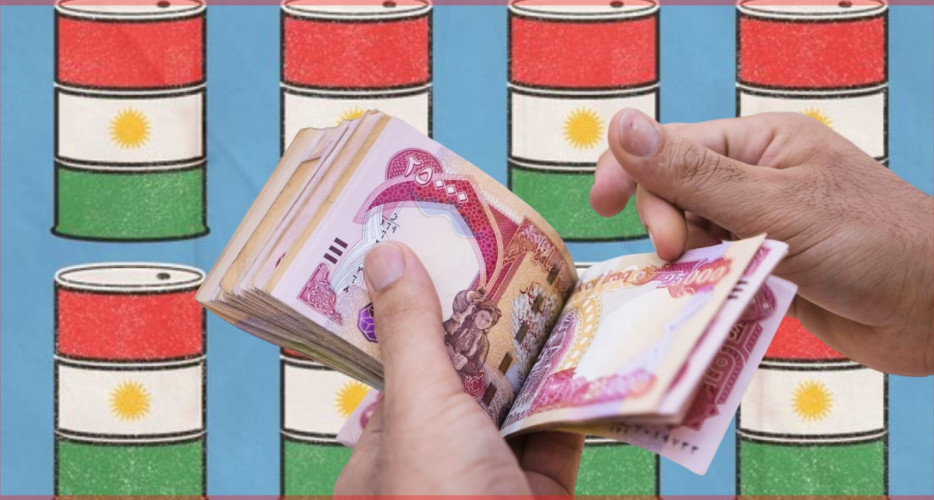
Peregraf
The Kurdistan Region stands to benefit in a number of ways if regular budget transfers from Iraq’s federal government resume: guaranteed payment of salaries to public servants, new infrastructure, loans, and improved access to markets in the south. But these are only possible if Erbil ends independent oil exports, according to legislation making its way through the Council of Representatives in Baghdad.
Parliamentarians are currently considering a three-year budget bill that will send 12.67% of the federal budget to the Kurdistan Region if it abides by a number of conditions. If implemented, it would be the longest period of sustained cooperation between Erbil and Baghdad on the budget in decade and give a solid footing for the Kurdistan Region’s finances through 2025.
"The most important benefits of the agreement with Baghdad are to guarantee the salaries of public servants, which will take the salary problem off the shoulders of the Kurdistan Regional Government [KRG], and to revive the market in the Kurdistan Region," Jamal Kochar, a Kurdistan Islamic Union (KIU) MP in the Iraqi parliament and a member of the finance committee, told Peregraf.
Patriotic Union of Kurdistan (PUK) MP Narmin Maruf, who is also a member for the finance committee, told Peregraf that the Council of Representatives may vote on the budget bill as soon as this coming week.
Since 2014, the KRG has regularly had difficulty making payroll due to disagreements with the federal government over the budget. Both sides claim that the other has not been meeting their responsibilities under the budget laws passed by parliament. In the past, the federal government has retaliated by stopping cash transfers to the KRG. Other factors have also posed challenges for Erbil include the war against Islamic State (ISIS), low oil prices, and the COVID-19 pandemic.
Theoretically, government employees in the Kurdistan Region are supposed to be paid in full every 30 days, but this becomes much more difficult when Baghdad cuts off transfers. Kochar argued that the KRG was using this dynamic to ensure that its financial dealings are opaque.
"This is a card that the Kurdish regime uses to intimidate people, so that Kurdistan's domestic revenue, including oil, is not visible," the KIU MP said.
The KRG’s failure to pay salaries regularly or in full has contributed to mounting public frustration. In 2020, doctors, teachers, and other public servants staged strikes after government did not pay them.
He noted that many government employees in the Kurdistan Region are already paid by the federal government, including those working at airports, the borders, and hydroelectric dams.
"They are Kurds and receive salaries from Baghdad, without any damage to the sovereignty of the Kurdistan Region. [The KRG’s argument] has no basis," he said.
KRG Cabinet Secretary Amanj Rahim said earlier this month that the KRG needs 887 billion Iraqi dinars ($677 million) each month to pay public servants and pensioners in the Kurdistan Region. On May 14, an agreement between the Kurdistan Democratic Party (KDP) and the PUK stressed that making these payments was the top priority of the government.
Kochar believes that a new budget agreement with Baghdad will resolve many of the remaining hurdles, particularly if the federal government takes over responsibility for marketing Kurdish oil following an arbitration ruling that cast serious questions over whether Erbil can export oil independently. Previously, it had been exported via a Turkish pipeline at a steeply discounted rate.
"KRG oil will no longer be sold at a price lower than the world markets and the revenue will be used to serve the people of the Kurdistan Region, including guaranteeing the payment of salaries," he said, adding that the contracts signed by the KRG with international oil companies and oil service companies should be reviewed.
This would represent a fundamental change in how the energy sector in the Kurdistan Region operates. The groundwork for this shift was laid down in an agreement between the federal government and the KRG earlier this year. Both sides say they hope that it will pave the way for the passage of a national hydrocarbons law and joint prosperity in the future.
"If the agreement is implemented, the Kurdistan Regional Government will have no problems in providing salaries to employees," Omid Naqshbandi, a member of the Kurdistan Contractors Union, told Peregraf.
"When the KRG has no political problems with Baghdad, it will lead to economic recovery. This is very important for contracting because contractors work with government money," he added.
The budget problems have hit contractors hard. Naqshbandi claimed that the KRG owes the members of his organization at least $400 million.
The new budget agreement "will be an opportunity to restart projects and pay contractors," he said. "The government can do this within a year to two years."
Additionally, the government is the most important employer in the Kurdistan Region. When salaries are not paid in full or on time, there are significant knock-on consequences for the local economy.
Sumer is typically a busy time at Luqman Ahmad’s shop in Erbil, where he sells electrical appliances. He stocks up on coolers and other items that will make the sweltering temperatures tolerable, but has trouble selling his wares when people do not have money to spend.
"The budget will revive the market in general," Ahmad told Peregraf. "Once the KRG distributes the salaries on time and quickly, the market will revive. People are impatient with this situation, which affects the market."
Kochar argued that the new budget law would also give businesses and individuals in the Kurdistan Region access to loans from Iraqi state-owned banks like Rasheed Bank and Rafidain Bank.
"The KGR should guarantee loans from these two banks to its employees, like [the federal government does], so that the employees and citizens of the Kurdistan Region can benefit from their services," Kochar said.
"Markets and dozens of small projects will benefit," he predicted.